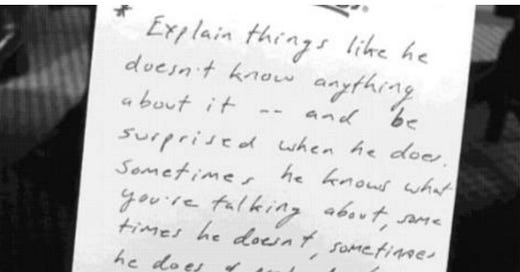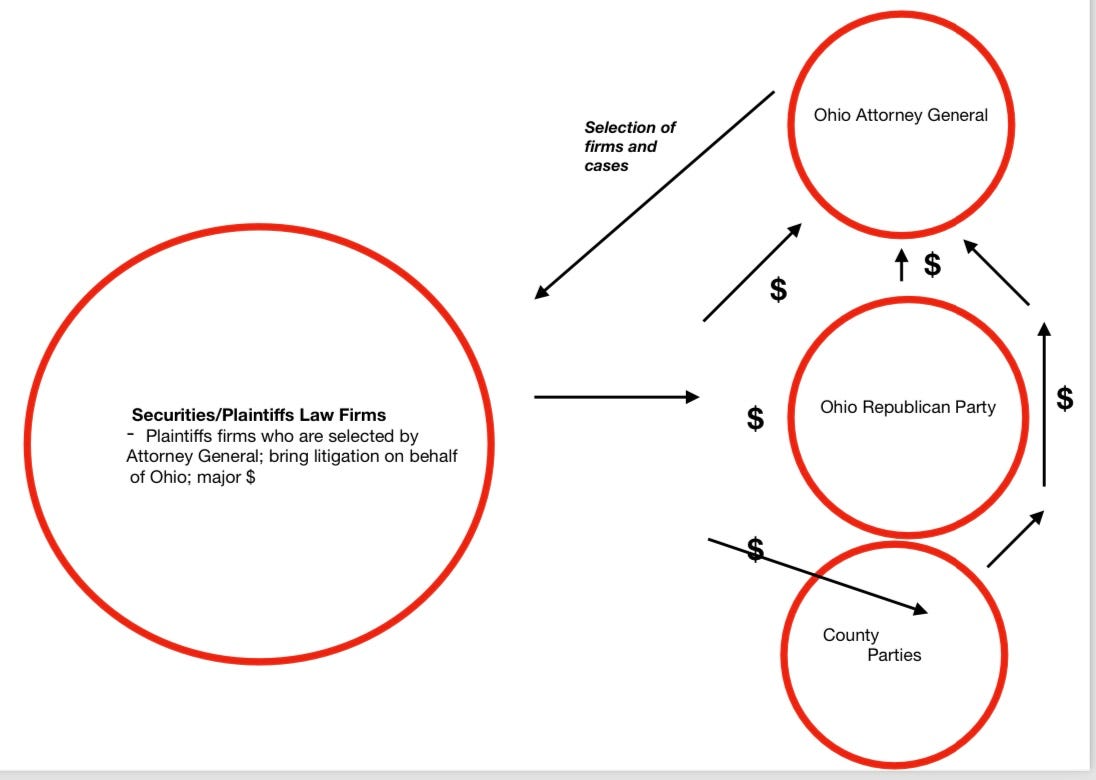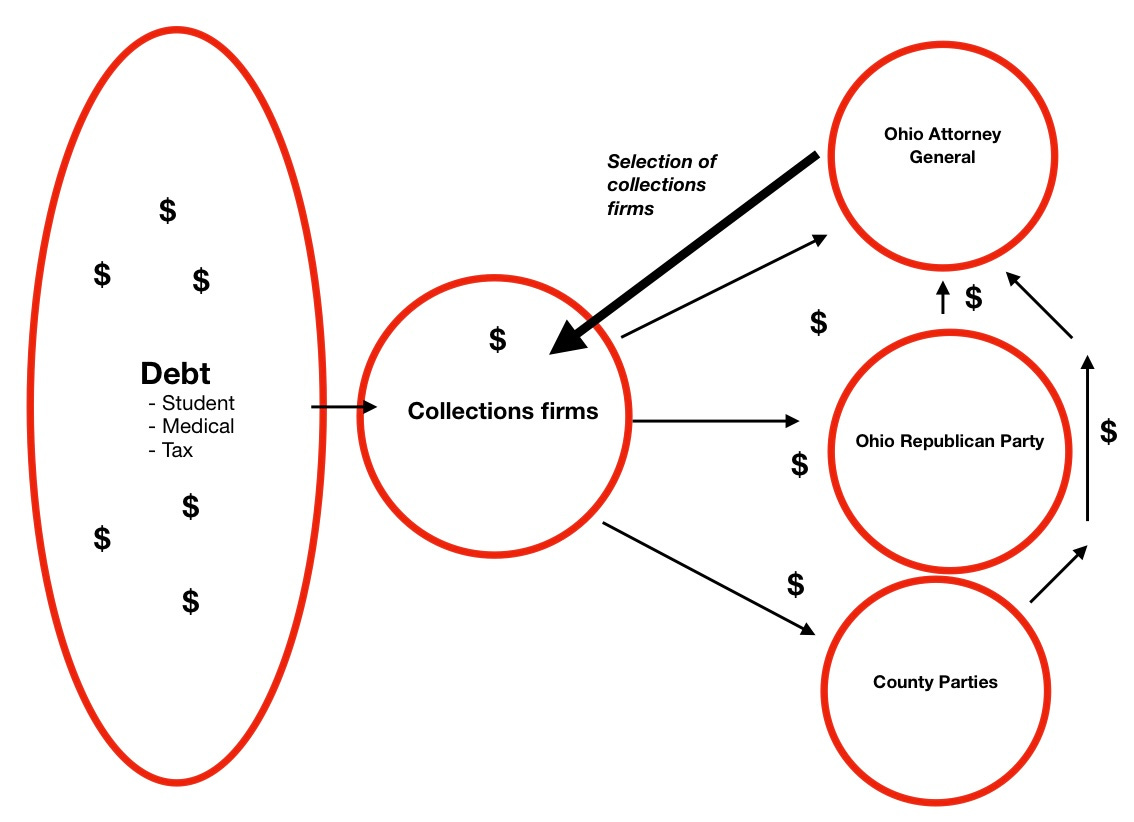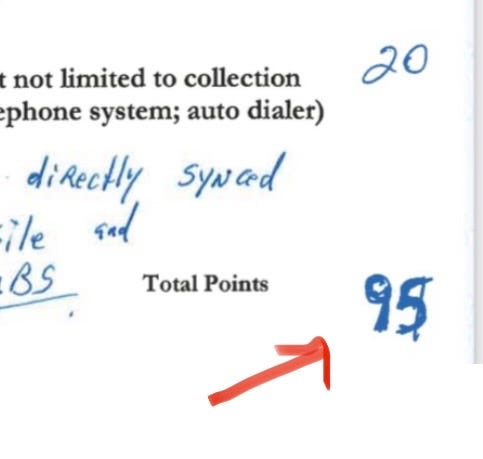There’s been such an avalanche of revelations about the First Energy scandal in Ohio of late, it’s hard to keep up.
So here’s a quick review:
First Energy gave $1 million to a dark money PAC to support Lt. Gov. Jon Husted when he ran for Governor;
First Energy gave $2.5 million to a dark money PAC to support Mike DeWine’s run for Governor;
First Energy gave $500K to the Republican Governors Association to support Mike DeWine’s run for Governor—which came only a day after a meeting where DeWine, Husted and a First Energy lobbyist discussed their priority issue;
First Energy’s CEO hosted a fundraiser for DeWine at his home.
That’s a lot of money.
And it came in a race (2018) where DeWine was tied or trailed much of the Fall, and only won with a surprise last-minute surge (DeWine’s own pollster told him he was going to lose heading into the final weekend of the election). So it’s safe to say this money made a huge difference in the ultimate outcome up and down the ticket.
What’s DeWine’s response to all these damaging revelations?
“Aw, shucks,” a shrug of the shoulders, and a whole lot of claimed ignorance.
Specifically, DeWine wants us to believe all of the following at once:
He didn’t know about the millions in dark money (“We don’t have that information”).
He doesn’t remember most of the key conversations (“I don’t remember that.”).
He would’ve supported HB6 anyway.
He named Sam Randazzo to chair the utilities commission (after First Energy made clear they wanted him to) because he thought Randazzo was a good, smart guy. Aw shucks.
He doesn’t remember the Randazzo appointment coming up in a private meeting with First Energy (even though others make clear it did come up, as do notes from the meeting).
He didn’t know about the $4 million payment to Randazzo only weeks after he agreed to recommend him, and even when his own staff knew about the payment within weeks of it being made, and before the appointment went through.
On and on. Reminds me of that song, “it wasn’t me!”
Add it all up, and DeWine wants Ohio to believe that even though:
1) he didn’t know about all that money that likely saved his hide; and
2) even though he doesn’t remember conversations where First Energy explained their top priorities around the time period where all that money was flowing (and after he’d won);
that 3) he just happened to go to great lengths to do the precise things First Energy wanted him to do in those conversations he can’t remember.
Do you believe all this?
Is it really conceivable that someone benefitting from all that money, in a razor tight election, who would go on to make the very decisions the donors of all that money wanted him to make (not only on the substance of what they wanted, but in rigging government to make sure it happened), knew about none of it?
Hold off on your answer for a second—because I have two data-points to share:
1. “Sometimes he does and pretends he doesn't.”
The first comes from First Energy itself.
Specifically, a handwritten note passed from a First Energy lobbyist (and former DeWine staffer) to the executive who was planning to broach the Randazzo appointment at a private dinner shortly after DeWine won the governor’s race.
Here’s the note:
What does it say? Well, in addition to confirming that the appointment was discussed despite DeWine’s allegedly fuzzy memory, it also says this:
“Explain things like he doesn’t know anything about it — and be surprised when he does. Sometimes, he knows what you’re talking about, sometimes he doesn’t, sometimes he does and pretends he doesn't.”
Also, “No paper, no sharing.”
If his former staffer, and First Energy lobbyist, is literally articulating that that’s DeWine’s MO — “sometimes he [knows] and pretends that he doesn't”—maybe the rest of Ohio should take that staffer at his word now, when DeWine is “pretending that he doesn’t” know.
(Of course, DeWine says he can’t remember what was discussed at this meeting as well.)
2. Past is Prologue
The second data point is that this is all deja vu for one person in particular….
Your’s truly.
Because I ran for Attorney General against DeWine. And over the course of the race, being the researcher that I am, I was shocked by the egregious pay-to-play I and others uncovered. And not only did it happen, quite openly (not even using dark money), but I found clear instances where DeWine was directly involved in it—just like above. We’re talking meetings. Notes. Schedules. Emails. And big money, often being sent right around the time of Attorney General decisions favoring those writing the checks.
Here’s just one example: an email where DeWine scheduled a meeting with an old friend and donor:
After several more meetings with DeWine, this old friend started a new company only days before a bid for work was publicized, and would go on to win that bid over vendors who had done that work for years. And it all started with this DeWine email.
And when confronted with receipts like this (I would bring binders of them to our newspaper editorial board discussions and pass them out), what did DeWine always say?
“Aw shucks…I didn’t know…I would never do that….I wasn’t part of it….We’ll do better…The guy who got the work was a good guy.”
In short, same as now: “sometimes he [knows] and pretends that he doesn't.”
And even when I’d respond by pointing to that email showing that DeWine personally set up the meeting, or that that donor had been completely unqualified for the bid he won, his next answer would be (like with Randazzo)—“oh, he was a good guy. Did a good job.” And for the most part, the press shrugged and let it go. Or framed it as a “he said, she said” and then moved on.
I laid the receipts right in front of them—they were as blatant as can be—but outside of the reporters who uncovered some of the stories, the press largely didn’t want to see them.
Because if you did believe them, then the picture I was painting was a really really bad one. Just like the picture in Ohio is today.
And what did all my receipts show, big picture?
Let me walk through the extent of what the press shrugged off 10 years ago. Because when you see it, you will see just how much of a preview we got then about of what is happening now. And of course, it’s bigger even now—because a Governor has even more power (and potential to incorporate pay-to-play into public functions) than an Attorney General.
Rampant Pay to Play as AG
There were two primary areas of pay to play in the Attorney General’s office, centered around two lucrative private opportunities: the decision of who got to represent Ohio in lucrative securities suits on behalf of Ohio pensions funds, and the decision of who got to represent Ohio when it came to collections of unpaid debt or taxes.
And here is how both functions were converted into massive pay-to-play operations that directly benefitted DeWine campaigns—and, ultimately, his own personal finances:
1. Securities Litigation
Attorney General DeWine conducted an annual bid “process” to select a panel of securities law firms to represent and consult Ohio on securities litigation (suing companies on behalf of Ohio’s enormous pension funds). These firms stood to make millions or hundreds of millions in fees should they succeed in bringing cases on behalf of the Ohio AG. For example, a settlement of the Bank of America case led to $152 million in attorney’s fees. (Dayton Daily News, 1/26/2014)
The firms selected to be on this panel gave tens and sometimes hundreds of thousands to either DeWine directly, to the Ohio Republican Party which then sent the money to DeWine in large chunks, or to the Summit County Republican Party, which did the same. The total amount given over his first term was more than $1 million. (Secretary of State, Dayton Daily News, 1/26/2014, Associated Press, 6/26/14)
Most blatantly, much of the giving from these firms happened at the very moment that the bid process to select the next year’s panel took place. (Dayton Daily News, Associated Press, 6/26/14). Dozens of checks totaling thousands of dollars were written to DeWine and the Party at the exact moment where the AG Office was making the decisions.
In 2011:
the first annual bid was announced on March 11, the responses were due April 1, and the decisions were announced on May 2;
Shortly before, during and after the submissions—but before the May 2 announcement of who was selected--$75,000 was raised from 2 firms that were ultimately selected in that bid process;
Numerous other firms selected gave generously to the Republican Party or the Dewine campaign within several months of the start or end of bid process, totaling hundreds of thousands of dollars.
In 2012, it got worse:
The annual bid was announced on May 30, the responses were due June 27, and the announcement of the selections was August 8;
During the bid process, and before the August 8 selection announcement, 6 law firms contributed dozens of checks directly to Dewine, totaling tens of thousands of dollars. (Secretary of State website);
Four law firms sent at least one check on the same day that they submitted their responses to the bid. One firm sent four checks totaling $16,000 on the same day, and one of those checks was sent (and signed) from the same person who signed the RFP proposal on the very same day. These checks were all illegal and had to be returned after a newspaper pointed them out (Dayton Daily News);
Two firms gathered and sent multiple checks to Dewine’s campaign in July—after they had submitted their proposals, but prior to the decision by the AG’s office on the fate of their proposals. They were selected only weeks later. (Secretary of State website)
Two law firms selected in the 2012 process had been rejected the year before. While their proposals for the work had hardly changed, both gave tens of thousands of dollars in the year following the rejection of their bid (one to the Ohio Republican Party, the other to the Summit County Republican Party). Then they were selected the next year. (Secretary of State, Dayton Daily News, Associated Press)
2. Collections Work
In a close look at a similar time period, the Dayton Daily News exposed that DeWine also engaged in a major pay-to-play scheme involving attorneys and vendors doing collections work on behalf of the state of Ohio:
Between 2010 and 2014, attorneys handling debt collections, their firms, and close family donated $1.36 million to DeWine and the Ohio Republican Party. For 30 attorneys who donated more than $10,000, the average annual earnings from collections work for the Attorney General was $796,500;
Like the RFP described above for securities litigation, there was an annual “selection” process for these firms. In two months prior to DeWine’s 2014 selections for debt collectors, attorneys and vendors seeking the work donated more than $215,000 to DeWine and the Ohio Republican Party. Much of it was donated while the bidding process was open or submitted bids were under consideration. This same pattern occurred in 2011, 2012 and 2013;
At one point, DeWine met in his office with David Myhal, his campaign fundraiser, and Alex Arshinkoff, a registered lobbyist and chair of the Summit County GOP, to discuss collections work.
Also in his office, DeWine and Myhal (again, his fundraiser, not an AG staffer) reviewed lists of collections vendors and attorneys after those bidders submitted their proposals and only weeks before final selections were made. (How do I know? Because a public records request for that meeting actually led to a release of the list of bidders that they were reviewing—yes, that too was in the binder).
Myhal also hosted a fundraiser at least one time during an open bid window (invitation was in the binder).
Often these vendors would give to the Ohio Republican Party, instead of DeWine. Often in far larger amounts. Well, between 2010 and 2014, the Ohio GOP donated $2.7 million to DeWine’s campaign and the Summit County GOP donated over $400,000. The chart below captures how it all flowed:
Paying Himself Back
One other thing:
To win his campaign for Attorney General in 2010, DeWine personally loaned his campaign $2 million loan.
Over DeWine’s first term as Attorney General, he paid himself back $1.7 million of those $2 million. Right into his own bank account.
When he was clearly so eager to pay himself back, do we think he didn’t know where all the money he used to pay himself back had come from?
Remember that note: “sometimes he [knows] and pretends that he doesn't”
No Merit-Based Paper Trail
One other thing. In cases of suspected pay to play such as this, the best defense an official can offer is that there is some type of transparent selection process that can explain all these highly suspicious selections and perfectly timed donations.
Do we have that here?
Nope.
I’ve written elsewhere how one collections bid process literally had hand-written scores altered in a way that favored that DeWine donor (the one from the meeting he set up above) over other, far more qualified bidders:
And regarding the securities litigation, there is little to no documentation for how the Attorney General’s Office selected the securities firms to be on the sought after panel.
On June 26, 2014, the Associated Press reported that the Attorney General’s Office “can provide little written evidence the selection committee completed its work. A public records request by the AP turned up no judges’ notes, scoring sheets, email exchanges on firms’ qualifications or recommendations made to DeWine.” The AGO admitted it eliminated a merit-based process that had existed under prior AG Richard Cordray.
A separate series of public records obtained in 2012 and 2013 revealed the same. In response to requests, the Attorney General’s office stated that “there are no records” of documents:
“outlining the evaluation process that the Securities Litigation Committee, the Attorney General and Attorney General staff utilize to evaluate RFQ proposals submitted by law firms and lawyers”
“detailing the specific evaluation, ranking and/or scoring of each firms’ proposals”
Comprising “recommendations and evaluations of proposals from the Securities Litigation Committee to the Attorney General or Attorney General staff.”
The office explained that for Fiscal Year 2012, only two meetings were conducted and a “verbal recommendation” was made to the Attorney General. And the office acknowledged that for Fiscal Year 2013, “a less formal process” was followed. So according to the AG, there are no records whatsoever of meetings, makeup of the selection committee, recommendations” because no meetings or formal process took place.
Only a very rudimentary (and empty) Excel spreadsheet was turned over, and it was not filled out, circulated or shared with the AG. (Associated Press, Plunderbund)
Bottom line: There’s a near perfect correlation between who was shoveling money to DeWine in all the ways I outlined above, and who was chosen to be on his vaunted law firm panel—at the same time that there is zero paper trail of any merit-based process on the official AG side about how they selected law firms to be on that panel.
At one point, I literally put together my first ever whiteboard (in a cartoon version) to try to explain all this:
Remember that note:
“Sometimes, he knows what you’re talking about, sometimes he doesn’t, sometimes he does and pretends he doesn't.”
“No paper, no sharing.”
Folks, what’s happening with First Energy isn’t new.
We’ve seen the pay to play, and the “aw shucks defense,” before.
We’ve seen the meetings. The notes. The well-timed contributions. The government decisions that benefit the very people and institutions giving the money.
And all the same excuses. The pretense of not knowing.
It was the exact same combination a decade ago in the Attorney General’s Office. And all that was even more documented than this time. Heck, it wasn’t even dark money then—all publicly reported.
What’s that old saying: “Fool me once, shame on you. Fool me twice, shame on me.”
Don’t get fooled again, Ohio.









Thank you for keeping spotlight on Ohio corruption, Mr. Pepper but seems like everone has become complement, even voters, till now.
deV is following reagan's mo. We the people never realized or didn't pay attention when mccon and recons were decteted by donors, bring in their cronies into government, and stacking the courts; and now their decades of planning had enriched them and have born the poisonous fruits for the American people. Biggest horrific example is the overturned abortion rights by sc. And off course the democrats were either willing or helpless minority or slept when had majority.
What could go wrong when the utilities, pension funds, generally everything are managed by private interests?
"🎶We won't be fooled again, won't be fooled again!🎵" Seriously, thank you David, this is an amazing summary and I am flagging it to go through again in more detail later. Where would Ohio be without you?